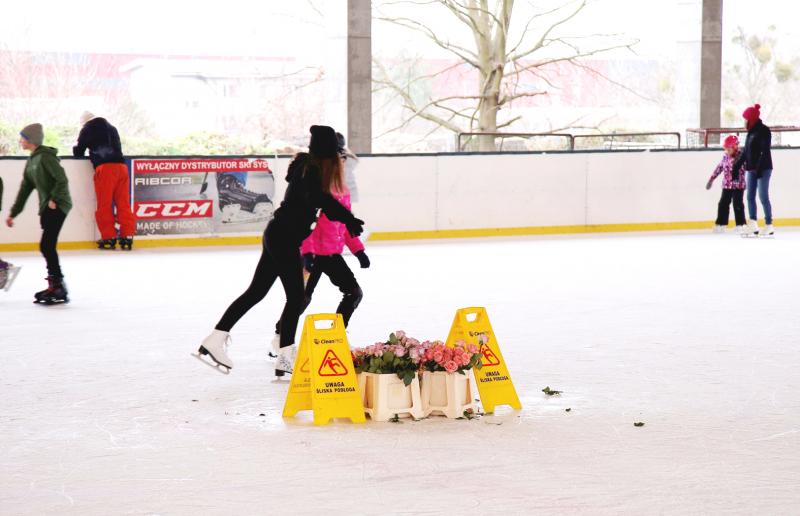A skating rink owner in Szczecin, Poland, believes that he has found a way to keep his business open, despite COVID-19 restrictions: operate as a flower shop instead.
His plan is simple — the customer has to purchase access to the flower “warehouse,” then chooses from a box of flowers in the middle of the rink.
“You can jump, crawl or go on all fours ... you don’t have to wear skates,” Tomasz Fornalski, owner of the Lodogryf Skating Rink, told broadcaster TVN, which showed skaters holding pink roses as they circled the rink.

Photo: Reuters
His plan emerged as Poland imposed a three-week lockdown closing hotels, ski slopes, skating rinks and other businesses from Monday last week to stem COVID-19.
Poland weathered the first wave of the pandemic well compared with Western Europe, but faced a new spike in October and November last year.
Officials said that the national quarantine was aimed at preventing a major third wave in the coming months, just as the country has started vaccinating people.
Szczecin city officials said that Fornalski is breaking the rules.
“A decision has been taken and communicated to the owner to stop this activity, and this decision is immediately enforceable,” Szczecin Provincial Sanitary and Epidemiological Station spokeswoman Szczecin Malgorzata told TVN.
Fornalski said that he had yet to receive a formal notification.
“Until we receive the administrative decision to halt our service, we will continue to operate,” he told the broadcaster.
Fornalski is not the only one getting creative.
A ski slope in Szczyrk is also continuing to operate its chair-lift for sledders instead of skiers in an attempt to get around the restrictions.
TVN footage showed a slope full of sleds at the Skrzyczne ski resort, with even a few skiers going down the hill.

Kehinde Sanni spends his days smoothing out dents and repainting scratched bumpers in a modest autobody shop in Lagos. He has never left Nigeria, yet he speaks glowingly of Burkina Faso military leader Ibrahim Traore. “Nigeria needs someone like Ibrahim Traore of Burkina Faso. He is doing well for his country,” Sanni said. His admiration is shaped by a steady stream of viral videos, memes and social media posts — many misleading or outright false — portraying Traore as a fearless reformer who defied Western powers and reclaimed his country’s dignity. The Burkinabe strongman swept into power following a coup in September 2022

‘FRAGMENTING’: British politics have for a long time been dominated by the Labor Party and the Tories, but polls suggest that Reform now poses a significant challenge Hard-right upstarts Reform UK snatched a parliamentary seat from British Prime Minister Keir Starmer’s Labor Party yesterday in local elections that dealt a blow to the UK’s two establishment parties. Reform, led by anti-immigrant firebrand Nigel Farage, won the by-election in Runcorn and Helsby in northwest England by just six votes, as it picked up gains in other localities, including one mayoralty. The group’s strong showing continues momentum it built up at last year’s general election and appears to confirm a trend that the UK is entering an era of multi-party politics. “For the movement, for the party it’s a very, very big

ENTERTAINMENT: Rio officials have a history of organizing massive concerts on Copacabana Beach, with Madonna’s show drawing about 1.6 million fans last year Lady Gaga on Saturday night gave a free concert in front of 2 million fans who poured onto Copacabana Beach in Rio de Janeiro for the biggest show of her career. “Tonight, we’re making history... Thank you for making history with me,” Lady Gaga told a screaming crowd. The Mother Monster, as she is known, started the show at about 10:10pm local time with her 2011 song Bloody Mary. Cries of joy rose from the tightly packed fans who sang and danced shoulder-to-shoulder on the vast stretch of sand. Concert organizers said 2.1 million people attended the show. Lady Gaga

SUPPORT: The Australian prime minister promised to back Kyiv against Russia’s invasion, saying: ‘That’s my government’s position. It was yesterday. It still is’ Left-leaning Australian Prime Minister Anthony Albanese yesterday basked in his landslide election win, promising a “disciplined, orderly” government to confront cost-of-living pain and tariff turmoil. People clapped as the 62-year-old and his fiancee, Jodie Haydon, who visited his old inner Sydney haunt, Cafe Italia, surrounded by a crowd of jostling photographers and journalists. Albanese’s Labor Party is on course to win at least 83 seats in the 150-member parliament, partial results showed. Opposition leader Peter Dutton’s conservative Liberal-National coalition had just 38 seats, and other parties 12. Another 17 seats were still in doubt. “We will be a disciplined, orderly